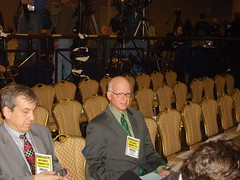
Parts one and two. Please note, although McCain is a central figure in these posts they have little to do with McCain and everything to do with the press.
Two different reporters at TIME's Swampland today linked to an op-ed in the NYT, The Maverick and the Media. The entire piece is well worth reading (though I think the connection with liberalism is a bit forced) but what is most interesting is the first line:
It is certainly no secret that Senator John McCain, the presumptive Republican presidential nominee, is a darling of the news media.
That isn't the point of the piece. It's a given, treated as established fact. We're past the point of debating whether or not the press loves McCain and to the dissecting of exactly why. What's so sad about the press relationship with McCain is that nearly everyone in the press agrees that the press treats him very favorably but few see it as a problem and fewer still take any action to correct it.
Anna Marie Cox and Howard Kurtz vapidly agree that McCain reporters, including Cox herself, are "part of the bubble, part of the team." I've transcribed some of this before but the full transcript is available so I'll quote it at length:
COX: Well, you just saw it. It's true that he can -- especially -- it's almost always someone who has not -- who hasn't been with the campaign, you know, through it all that's going to make a call that makes him look bad.
I remember the lightsaber moment from 2000. That was from someone -- when he said he was going to be -- you know, fight Darth Vader.
KURTZ: But that suggests that the people who have been traveling with him regularly...
COX: Yes.
KURTZ: ... become part of the bubble, part of the team?
COX: Become part of the bubble, and also, I mean, I think what happens is that you -- if you've been covering him for a long time, there's a sense that, well, he does that all the time, it's not worth reporting, because he does -- he's a cranky old man. I mean, to be quite frank.
You know, like, and also, I've gotten much tougher terseness than Bumiller got just there. And...
KURTZ: But the cameras weren't rolling.
COX: But the cameras weren't rolling. And also, we wrote it off to, like, you know, he hadn't had his fifth cup of Starbucks today.
KURTZ: But is there a tendency for journalists to cut more slack for candidates who they have a lot of opportunity to talk, not necessarily because they like them, but because they're not just getting one crack at that person for eight minutes every three days?
TAPPER: Yes. And that's the exchange that the McCain people make now, and we'll see if it lasts until November. But, you know, they have this constant access.
I spent a couple weeks ago -- I did a couple days with each of the candidates, Obama, Clinton, McCain. And I got more time with McCain -- not just me, all of the press corps -- in one day than I had gotten with the other two candidates the entire time.
And that's the exchange. And from 80 percent of the time it's to McCain's benefit and 20 percent it's not. But two points to make about that exchange.
One is "The New York Times" is not currently his favorite newspaper. And the other point is Elizabeth Bumiller was catching him in a lie that he told in 2004. He had been lying. He said no, he hadn't had that conversation. So it was, by definition, a "gotcha" question, and he doesn't like that, but he especially doesn't like "The New York Times."
[...]
KURTZ: And McCain did hold a barbecue for the press at his ranch in Sedona, where some people were in attendance.
COX: Yes. Delicious dry-rub barbecued ribs, actually, baby back ribs.
KURTZ: Firsthand report.
Oh Cox and Kurtz you wonderful comedians. First discuss, without any remorse or introspection, how you cut McCain a break then joke about it just for good measure, a giant middle finger to the audience. It's important to note a few things here:
1. Cox is not attacking other members of the media for giving McCain a free pass. This is not criticism. She is the one giving the free pass.
2. Parse through Tapper's comments carefully. Catching McCain in a lie is somehow a "gotcha" and "he doesn't like that." Put that together with what Cox said above, that only newbies ask those "gotcha" questions; only people outside the bubble bother to point out when McCain is lying, because people who are part of the team don't want to rile up McCain -- and they don't report on it anyway because they know he's just a grump.
It appears that cozy relationships lead to poor reporting but reporters defend those relationships to death. I spoke to a reporter who attended the McCain BBQ and he/she stressed the importance of getting to know the subject of coverage. (The reporter refused to be quoted on the record, of course) Responding to reader comments at Swampland Michael Scherer makes a similar point:
Rather, in these settings, on the bus or in a press conference, the competition among the reporters is not to suck up, but to come up with the question that actually produces new information or catches the candidate off guard. There are also other times, after hours and often off the record, when relations between press and campaign staff can be more informal, but even there I think the ultimate goal is almost always professional. We build relationships with people so that they can trust that we will not unfairly treat them, which facilitates the flow of information.
The first half of that obviously contradicts what Kurtz, Cox and Tapper amiably blathered about above. The second half is the killer: even schmoozing off the record is supposedly professional as it builds relationships, engenders trust and facilitates the flow of PR. Hey, did you know that McCain is an all-American dad who shops at Cosco and makes a mean lemon rub?
In an earlier part of the transcript above Cox defends close relationships as well, speaking about the reporting of Samantha Power's comments and echoing Tucker Carlson:
Like, she doesn't have -- she's probably never going to interview Samantha Power ever again. And she probably isn't going to cover the Obama White House should there be one.
I think that a journalist who wants to continue working, I mean, you can call it a sad truth, but it is a truth that you need to keep -- you need to maintain relationships with your sources. And part of maintaining a relationship means having some kind of contract with them that you're not going to do anything unfair. And...
Remember that the "unfair" part here was reporting what Samantha Power actually said in an on the record interview.
On one hand these people tell us that they cultivate sources for the sake of accurate reporting, while at the same time informing us that they'll suppress the truth in favor of cultivating those sources. They tell us that personal relationships lead to better reporting, then admit their own relationships with McCain color their coverage of him. It can't be both.
Here is a novel suggestion for our intrepid press corps: instead of being jovial about your McCain love affair recognize it as a problem. It's not funny. Stop defending behavior at the root of the problem.
Put down the champagne glass, get out of the tire swing and put your shoe back on. Pass on the lobster or, gasp, the party entirely. Get off the bus and find your own ride. Reacquaint yourself with your duty to avoid even the appearance of conflict of interest. The next time you think about catching McCain in a lie do it and then report it, whether he likes it or not. Instead of maintaining access by producing fluff pieces about your personal ride on the wonderful tour bus or about McCain's totally hip and awesome daughter take a chance at real reporting.
It's called "journalism."
And no, it's not balance if you ride around in the Obamamobile and the Clintoncopter as well.
I'll finish with a quote from Walter Lippmann.
A long life in journalism convinced me many presidents ago that there should be a large air space between a journalist and the head of a state.
Addendum
I just visited TIME.com and saw Putting McCain to the Ethics Test by Michael Scherer. I was ready to give credit where credit was due but his (metaphorical) place on the bus is safe. It's a wonderful example of timid reporting. The first negative words about McCain's ethics come in the fourth paragraph (talk about burying the lede) and come from the mouth of Howard Dean, a source readers will ignore as obviously biased. The rest of it is standard he-said/he-said "balanced" fair with any exciting details buried beneath masses of trivia. It's not until literally the very last sentence of the piece that readers are given a clear reason to care at all. It's almost as if Scherer was dared to produce the most benign piece possible given the facts. It also curiously leaves out the very contemporary ethical and legal questions surrounding McCain's FEC shenanigans.
Simply by copying and pasting it's easy to change the entire tone of the piece into something with teeth:
In the upcoming election McCain will be in the awkward position of hoping voters will give him the benefit of the doubt that he has denied to others. He is the one who regularly breaks the Senate's code of silence by alleging corruption by his peers. But high standards are a double-edged sword. Even as McCain has railed against the system, he's worked it, sometimes creating unseemly appearances of his own.
Bam, I just turned a snoozer into a must-read. (This is why they pay me the big bucks.) But a story that began that way might mean one less scoop of potato salad at the next shindig.
Read more!













.jpg)



